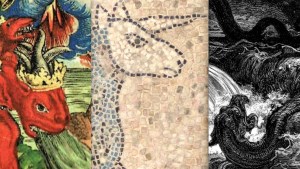The book of Genesis contains many interesting stories, especially those that occurred before the Great Flood. In particular, the author writes about a peculiar race of creatures called the “Nephilim.”
The Nephilim were on the earth in those days, and also afterward, when the sons of God came in to the daughters of men, and they bore children to them. These were the mighty men that were of old, the men of renown. (Genesis 6:4 RSV-CE)
Some English translations of the Bible replace “Nephilim” with the word “giants.” This has given rise to numerous claims that these men were actual “giants,” a different race from that of humans. This is further reinforced by an alternative interpretation of this passage that “the sons of God” refers to “fallen angels,” who for some reason began having sex with women. In this theory the Nephilim were extraordinary giants that were the offspring of angels and humans.
The primary problem with this theory is the reality that angels, being pure spirits, have neither body nor gender. Simply put, they were not created with anatomy to make that possible.
The word Nephilim is more accurately translated as “fallen ones,” and more likely refer to the fruit of immorality.
Biblical scholar Scott Hahn explains that “When people began to multiply on the face of the earth, ‘the sons of God,’ that is, the Sethite men, were seduced by the beauty of ‘the daughters of men,’ that is, the Cainite women. The beauty of the wicked proved stronger than the resolve of the righteous.” They violated the covenant they made with God and “fell” away from God. It is not surprising that after the mention of the Nephilim, “The Lord saw that the wickedness of man was great in the earth, and that every imagination of the thoughts of his heart was only evil continually” (Genesis 6:5).
Orthodox priest, Fr. Jonathan Tobias, explains it in the following way.
The “sons of God” are the people of Seth. And the “daughters of men” are those of Cain. This verse describes, in a short symbolic way, the tragedy of how Seth’s culture got mixed up with Cain’s culture. People not only intermarried, but more importantly, they gave up their belief. Seth’s people — or most of them — no longer sought God in their heart. They no longer prayed the old prayer of Adam and Eve that they prayed as soon as they left Eden: “Lord, have mercy on me.” Instead, Seth’s people started living the self-centered life of comfort, technology, power, greatness … and violence.
The Nephilim were indeed the “fallen ones,” and while they might have been extraordinary in their height and stature, they also resorted to violence and were condemned by God for their misdeeds.
The giants were born there, who were famous of old,great in stature, expert in war.God did not choose them,nor give them the way to knowledge;so they perished because they had no wisdom,they perished through their folly. (Baruch 3:26-28)
While it’s true that the Nephilim were wiped out with the Great Flood, they still live on today in a spiritual way. We can become “Nephilim” by our own actions every time we refuse to love God. We may not possess the same strength as the Nephilim, but we certainly can follow their path to self-destruction.

Read more:
Do angels have wings?

Read more:
5 Mythical creatures found in the Bible

